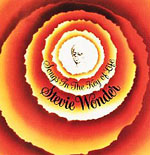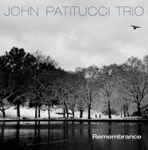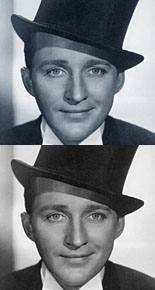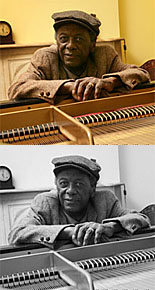Home » Jazz Articles » Old, New, Borrowed and Blue » Remembrance: Paying Tribute Through The Art Of Jazz Composition
Remembrance: Paying Tribute Through The Art Of Jazz Composition
Old
While jazz has suffered more than its fair share of tragic deaths and premature passings, trumpet players seem to be particularly susceptible. Fats Navarro, Kenny Dorham, Clifford Brown, Booker Little, Lee Morgan and Woody Shaw represent a significant slice of the jazz trumpet lineage, and their lives were snuffed out too early—whether by disease, semi-natural causes or tragic accident. While the memory of all these men lives on through their music, Brown was also the recipient of one of the most enduring jazz tribute songs ever written. Benny Golson's "I Remember Clifford" has proven, over time, to be one of the most oft-covered and recognizable musical memorials that jazz has ever known. A virtual who's who of jazz artists, regardless of their instrument of choice, has performed it at one time or another.

Brown, who exemplified clean living and hard work, was a shining light in the jazz world, and his group—co-led with drummer Max Roach—was one of the most popular groups in jazz at the time of Brown's passing in June of 1956. The automobile accident that killed Brown, pianist Richie Powell and Powell's wife Nancy (who was driving) caused shock and sadness throughout the music community. Trumpeter Art Farmer, in the studio at the time he heard the news, recalled that everybody tried to go on with the session but the news quickly eliminated that possibility and the session was over. Benny Golson, playing at the Apollo Theatre with Dizzy Gillespie at the time, has noted that everybody was in tears throughout their performance on the night that they heard about Brown's tragic passing.
While Roach penned a number of pieces, including "Tender Warriors" in honor of Brown and Powell, and "Praise For A Martyr," which was specifically for Brown, it's Golson's "I Remember Clifford" that has proven to be the most memorable tribute. Golson and Brown had worked together in the bands of Tadd Dameron and Lionel Hampton in the early 1950s, and both men were considered to be rising stars. With Brown's legacy and life on his mind, Golson wrote this composition and it has become an essential part of the standard jazz repertoire.
In the late 1950s, Lee Morgan performed one of the most stirring renditions of this piece. With his own tragic demise many years off in the future, Morgan was considered, at this time, to be one of the up-and-coming trumpet players, and he was holding down the trumpet chair in one of the most prestigious groups in jazz: Art Blakey's Jazz Messengers. The Jazz Icons DVD series, which has put out some amazing, previously unreleased jazz concerts from the past, gave the world a great visual of Morgan performing this song with The Jazz Messengers on their Live in '58 (Jazz Icons, 2006).
![]() Morgan, intensely observing his fingers, delivers the familiar melody with elegant ornamentation, passion and care. Golson, the composer, stands to Morgan's side and remains completely upright—almost standing in salute of his fallen comrade—as he gently provides some long mournful tones beneath the trumpet.
Morgan, intensely observing his fingers, delivers the familiar melody with elegant ornamentation, passion and care. Golson, the composer, stands to Morgan's side and remains completely upright—almost standing in salute of his fallen comrade—as he gently provides some long mournful tones beneath the trumpet.
Every jazz tribute song walks a fine line between respectfully honoring the deceased and addressing the joy that their music brought to the world. That joy is addressed when the quintet moves into double-time for Bobby Timmons' piano solo and Morgan's trumpet follow-up. The music returns to its more reverential roots as it nears its end, but by this point the two-tiered message of the song has been delivered and the band brings the song to an end. It's another example of musical triumph born of tragedy.
New
The idea for this month's column came about in January when I traveled into New York City to see vibraphonist Joe Locke perform at Dizzy's Club Coca-Cola. This club is the smallest of the three performance venues in the beautifully crafted Jazz at Lincoln Center complex, and it's stunning. For those who haven't had the opportunity to see it, a brief description will have to suffice. It's an intimate room overlooking Columbus Circle—the Southwest corner of New York City's Central Park—and its shape and wood features make you feel like you are on the inside of a giant piano. The acoustics and atmosphere in the room truly suit the groups that play there throughout the year.  During this particular week, Locke and his band were celebrating the release of his newest album, For The Love Of You (E1, 2010). Locke and his band, including bassist George Mraz, pianist Geoffrey Keezer and drummer Clarence Penn, traveled through different moods, styles and sounds during the set and they were enthusiastically received by the audience. The icing on the cake was the presence of vocalist Kenny Washington - Vocals, who appears on the album and sang beautifully throughout the evening.
During this particular week, Locke and his band were celebrating the release of his newest album, For The Love Of You (E1, 2010). Locke and his band, including bassist George Mraz, pianist Geoffrey Keezer and drummer Clarence Penn, traveled through different moods, styles and sounds during the set and they were enthusiastically received by the audience. The icing on the cake was the presence of vocalist Kenny Washington - Vocals, who appears on the album and sang beautifully throughout the evening.
While the set featured many great performances, and Locke and his group were in high spirits, the emotional and musical centerpiece of the night proving to be Locke's "Verrazano Moon." Locke wrote the music and lyrics to this song as a tribute to saxophonist Bob Berg, whose life was cut short when he was killed in an automobile accident on a snowy day in December of 2002. From the late 1960s up until his passing, Berg had worked alongside everybody from Horace Silver, Miles Davis and Randy Brecker to Locke himself. While Locke has recorded this song in different musical contexts prior to this album, hearing Washington deliver the touching lyrics that Locke wrote to honor Berg gave the song greater depth and emotional power.
Locke is that rare musical artist who can play as fast and furious as anybody, but can also get to the heart of the matter without resorting to musical fireworks. On this particular night, his gentle, descending flights were balanced out with some lush, yet tender, chords ringing out in the air. Though this song has only been recorded a few times, it serves as one of the most touching jazz tributes to be written in recent years; hopefully more musicians will explore it in times to come. In doing so, they'll have the opportunity to interpret a wondrous composition and pay tribute to Bob Berg.
Borrowed
Sadness might be an obvious part of tribute songs, but melancholic strains aren't a necessity, and many songs actually celebrate the positive energy that the honoree(s) bring to so many people. Stevie Wonder's "Sir Duke" is the perfect example. Wonder generally doesn't get placed in the jazz category, but neither is he borrowing his connection to the music. His relationship to jazz is actually an important part of his being. While funk laced hits like "Higher Ground" and "Superstition," the reggae-inflected "Master Blaster (Jammin')," or his long list of R&B songs come more immediately to mind when thinking about his musical legacy, Wonder has been mentioning his jazz ties from the very beginning.  Wonder's debut album, The Jazz Soul Of Little Stevie (Motown, 1962), arrived decades before he was performing at jazz festivals in various locales throughout the world, and gave Wonder an opportunity to stretch out on some instrumental-only tracks. While the general public will always clamor for his hits, jazz has been an important part of Wonder's live performances as well. Whether dishing out his rendition of Chick Corea's "Spain," improvising on John Coltrane's "Giant Steps," or performing Miles Davis' "All Blues" at the Montreal Jazz Festival, he has made it clear that this music is an important part of him. Plenty of people may never see him perform any of these jazz classics in a live setting, but many of these same people have heard him sing the virtues of jazz on "Sir Duke."
Wonder's debut album, The Jazz Soul Of Little Stevie (Motown, 1962), arrived decades before he was performing at jazz festivals in various locales throughout the world, and gave Wonder an opportunity to stretch out on some instrumental-only tracks. While the general public will always clamor for his hits, jazz has been an important part of Wonder's live performances as well. Whether dishing out his rendition of Chick Corea's "Spain," improvising on John Coltrane's "Giant Steps," or performing Miles Davis' "All Blues" at the Montreal Jazz Festival, he has made it clear that this music is an important part of him. Plenty of people may never see him perform any of these jazz classics in a live setting, but many of these same people have heard him sing the virtues of jazz on "Sir Duke."
This hit song, from Wonder's Songs In The Key Of Life (Motown, 1976), is a celebratory statement about the feeling that jazz can bring, and the joy that the masters brought to the music. While the song honors Duke Ellington, who had passed away a few years before its release, it also name checks other giants of jazz. Count Basie, Glenn Miller, Louis Armstrong, and Ella Fitzgerald, with her voice "ringing out," all receive nods on this grooving masterpiece. Ultimately, Wonder makes clear that it's all about the feeling; the joyous and dancing nature of jazz. In doing so, he forever cemented his relationship to the jazz elders and the music in general.
Blue
In August of 2009, I joined the throngs of people making a musical pilgrimage to Newport, RI. George Wein's revived Newport Jazz Festival was set to feature a diverse line-up, with groups of all shapes and sizes, but I was most anxious to take in some of Brian Blade's drumming. I've been enthusiastically watching this drumming dynamo in a variety of live performances, with musicians as diverse as Joni Mitchell, Edward Simon and Bill Frisell, and I knew I was going to get two different opportunities to hear him at Newport.
 I eagerly caught his set with Joshua Redman's double trio, and I sat under a tent and took in his intense performance with his Fellowship Band. When the weekend was over, and I was driving back to Long Island, I was already thinking about catching Blade and Joe Lovano in John Patitucci's trio the following weekend. While I hadn't heard much about Patitucci's project at the time, my interest in these musicians made this a must-see show. I ended up being very thankful that I made the trip to Dizzy's to catch one of their sets, which was built on the material from Patitucci's Remembrance (Concord, 2009). Patitucci sought to honor many different musicians with this project, from John Coltrane and Thelonious Monk to Olivier Messiaen, and he composed eleven different songs to express his feelings about these important artists.
I eagerly caught his set with Joshua Redman's double trio, and I sat under a tent and took in his intense performance with his Fellowship Band. When the weekend was over, and I was driving back to Long Island, I was already thinking about catching Blade and Joe Lovano in John Patitucci's trio the following weekend. While I hadn't heard much about Patitucci's project at the time, my interest in these musicians made this a must-see show. I ended up being very thankful that I made the trip to Dizzy's to catch one of their sets, which was built on the material from Patitucci's Remembrance (Concord, 2009). Patitucci sought to honor many different musicians with this project, from John Coltrane and Thelonious Monk to Olivier Messiaen, and he composed eleven different songs to express his feelings about these important artists.
While much of the material is discussion-worthy, from the short and catchy Lovano motif on "Mali" to the haunting title track written for Michael Brecker, I have a special fondness for "Blues For Freddie." This track honors Freddie Hubbard but it does so without taking too directly from the artist. It doesn't feature a trumpet player, it isn't performed at a fast clip, it doesn't present itself as a loving ballad and it doesn't feature Hubbard-isms all over the place. Instead, it almost seems to speak of Hubbard's confidence. The hip, no-nonsense approach and swagger that's present in Lovano's sound, and the firm footing provided by Patitucci along with Blade's tasty drumming, seem to point towards Hubbard's strong-willed musical nature.
Many people have addressed the fact that Hubbard tried to play his trumpet like a saxophonist in many regards. The limitations and restrictions that are native to the trumpet were taken on as more of a challenge than a crutch and Hubbard came closer, perhaps, than any other trumpet player in his pursuit of this ideal. In searching for a more fluid and flexible sound on the trumpet, Hubbard found his own direction...and legions of followers in the process. The fact that this song features a saxophonist paying homage to the trumpeter almost brings Hubbard's quest full-circle and certainly makes it a wholly appropriate way to honor this titan of the trumpet.
Stay tuned for more Old, New, Borrowed and Blue.
Photo Credit
Courtesy of Mosaic Records
< Previous
John Pizzarelli: A Tribute to Duke El...
Next >
Old Stuff
Comments
Tags
For the Love of Jazz
 All About Jazz has been a pillar of jazz since 1995, championing it as an art form and, more importantly, supporting the musicians who create it. Our enduring commitment has made "AAJ" one of the most culturally important websites of its kind, read by hundreds of thousands of fans, musicians and industry figures every month.
All About Jazz has been a pillar of jazz since 1995, championing it as an art form and, more importantly, supporting the musicians who create it. Our enduring commitment has made "AAJ" one of the most culturally important websites of its kind, read by hundreds of thousands of fans, musicians and industry figures every month.




















